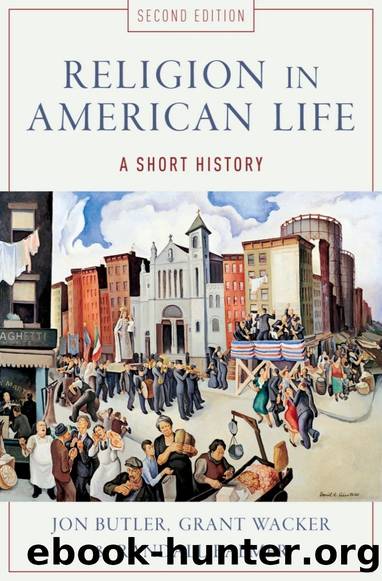Religion in American Life: A Short History by Jon Butler

Author:Jon Butler [Butler, Jon]
Language: eng
Format: epub
ISBN: 9780199832699
Google: l07w-hBH7RwC
Barnesnoble:
Goodreads: 12010637
Published: 0101-01-01T00:00:00+00:00
CHAPTER SIXTEEN
Conservers of Tradition
O God, our help in ages past,
our hope for years to come,
be Thou our guide while life shall last,
and our eternal home.
âIsaac Watts, âO God, Our Help in Ages Pastâ (1719) In the later decades of the nineteenth century millions of thoughtful Americans acquired a renewed appreciation for the religious wisdom of the past. We call these Americans conservatives because they felt that time-honored truths, tested and refi ned in the long experience of the human race, offered the most effective way to deal with the intellectual, social, and technological challenges of the modern world.
Religious conservatives came in a bewildering variety of forms. Some proved primarily interested in defending the authority and accuracy of the Bible. Others concerned themselves above all with strict standards of personal conduct.
Some found their greatest joy in the biblical promise that Jesus 274
CONSERVERS OF TRADITION
Christ would soon return. Still others looked to the traditions of their own extended family or ethnic group for guidance. What they all held in common was a simple though powerful conviction that the past held the key to the future.
From the early seventeenth century through the late twentieth century the Bible formed the bedrock of religious tradition in America. Before the Revolution the Crown barred colonial printers from producing the King James Authorized Version (hoping to protect sales for the kingâs printers). But after independence Americans rushed to meet the demand for English-language Bibles. Voluntary groups joined them. The largest, the American Bible Society, founded in 1816, was soon producing 300,000 copies per yearâfor a population under 13 million.
(In time the Society would print nearly four billion Bibles or portions thereof.) Nineteenth-century travelers, encountering town after town bearing names like Eden, Salem, and Bethlehem (not to mention Zoar, Ohio, and Mount Tirzah, North Carolina) might well have imagined themselves wandering through biblical lands in biblical times.
In many familes children received conspicuously biblical names such as Ezra, Elijah, and Naomi almost as frequently as John, Paul, and Mary (also biblical). All U.S. presidents took offi ce by swearing an oath on an open Bible. Many presidents, including Abraham Lincoln, Woodrow Wilson, and Jimmy Carter, memorized large portions of the Scripture and quoted it often. Even Thomas Jefferson, a skeptic, took the trouble to translate and print his own version of the New Testament. The great biblical images of Moses freeing his people, or of the city on a hill, or of the New Heavens and the New Earth, stirred deep feelings and provided an orientation for life. Jews cherished their Hebrew Scriptures with equal fervor. Some of the bitterest battles fought in the U.S. court system revolved around 275
RELIGION IN AMERICAN LIFE
the proper use of the Bible in public schoolsâshowing, among other things, that the Bible was never inconsequential.
When the literal truthfulness of the Bible came under heavy fi re from liberals in the late nineteenth century, believers everywhere rose to its defense. Charles Hodge, a theology professor at Princeton Theological Seminary for much of the nineteenth century, led the charge.
Download
This site does not store any files on its server. We only index and link to content provided by other sites. Please contact the content providers to delete copyright contents if any and email us, we'll remove relevant links or contents immediately.
| Africa | Americas |
| Arctic & Antarctica | Asia |
| Australia & Oceania | Europe |
| Middle East | Russia |
| United States | World |
| Ancient Civilizations | Military |
| Historical Study & Educational Resources |
Cecilia; Or, Memoirs of an Heiress — Volume 1 by Fanny Burney(32544)
Cecilia; Or, Memoirs of an Heiress — Volume 2 by Fanny Burney(31942)
Cecilia; Or, Memoirs of an Heiress — Volume 3 by Fanny Burney(31928)
The Secret History by Donna Tartt(19048)
Sapiens: A Brief History of Humankind by Yuval Noah Harari(14366)
Leonardo da Vinci by Walter Isaacson(13315)
The Radium Girls by Kate Moore(12017)
Sapiens by Yuval Noah Harari(5365)
How Democracies Die by Steven Levitsky & Daniel Ziblatt(5213)
The Wind in My Hair by Masih Alinejad(5091)
Homo Deus: A Brief History of Tomorrow by Yuval Noah Harari(4906)
Endurance: Shackleton's Incredible Voyage by Alfred Lansing(4768)
Man's Search for Meaning by Viktor Frankl(4580)
The Silk Roads by Peter Frankopan(4525)
Millionaire: The Philanderer, Gambler, and Duelist Who Invented Modern Finance by Janet Gleeson(4465)
The Rape of Nanking by Iris Chang(4202)
Joan of Arc by Mary Gordon(4099)
The Motorcycle Diaries by Ernesto Che Guevara(4089)
Stalin by Stephen Kotkin(3956)
